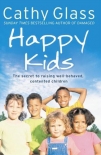Happy Kids, Cathy Glass [best ebook reader for ubuntu .TXT] 📗

- Author: Cathy Glass
Book online «Happy Kids, Cathy Glass [best ebook reader for ubuntu .TXT] 📗». Author Cathy Glass
Remember
* Pre-teens and young teens appear very grown-up, but don’t let them have sole responsibility for their behaviour. They haven’t the life experience or degree of self-regulation to handle it.
* Mutual respect, clear and consistent boundaries, discussion and reasonableness are the key components for successfully parenting teens.
* Guide the young person, advise them, listen to them and be there for them.
Quality time now is just as important as it was when your child was young. Invest time, and be patient and understanding, but remember that ultimately you are the adult and you are in charge of your young teen.
Older Teen: 15–18
There will be considerable variation in the level of maturity reached between young people in their late teens. Some will still need very firm boundaries in respect of their behaviour, while others will need only the occasional reminder. Regardless of their level of maturity, all older teens will need your guidance and advice sometimes as they face the many lifestyle choices that this age brings. They will also need your unfailing support when the decision they have made turns out to be the wrong one and the result is not as they anticipated.
Although your young person will be feeling more confident in his or her body (boys will be catching up with girls in their development), they will still be experimenting with their character and the image they want to portray. Older teens will also be faced with many important and often confusing decisions – about higher education, university, a career, relationships – as well as choices about alcohol, cigarettes, drugs, sex, etc.
Parenting an older teen is like being a coach on the sidelines: you are there to cheer them along, and offer encouragement and advice, but also ready to pick up the pieces and commiserate when things go wrong. Your sophisticated and independent sixteen-year-old daughter who goes off confidently to her Saturday job will soon be a child again, in need of comfort and support, when her first boyfriend lets her down, or when her exam results aren’t as good as she expected and she has to reassess her career plans.
Young people in this age group can be great company, enjoying a laugh and a joke at an adult level, and whose opinion you may seek. But they can also be very self-centred, focusing on their own needs and enjoyment to the exclusion of others’. What family hasn’t queued outside the bathroom door at 8.00 a.m. on a weekday while their teenage son or daughter hogs the shower? And what parent of a teen hasn’t spent a night of endless torment when their child didn’t arrive home until 3.00 a.m. when they were expected at 11.00 p.m.? Although older teens vary in their level of maturity, all parents will have had to deal with some of what follows, at some time.
Peer group influence
Your young person will probably have a large circle of friends by now, and he or she will be spending a lot of time with them, away from the family home. This is normal and healthy. As parents we have to accept that our sons and daughters prefer the company of their friends to ours – it’s a sign we have done our jobs well and encouraged their independence and sociability. You will know some of your son or daughter’s friends, but not all, and while you will hope they have made good choices in their friends, and are associating with young people with similar values and principles to your own, this can’t be guaranteed.
Neither can you protect your son or daughter from all undesirable influences. Antisocial or unsafe behaviour can seem very exciting and appealing to a teen, but by this age your son or daughter should have developed a sufficient moral code (thanks to you), and self-regulation, to generally make the right decision when it comes to what is acceptable or safe. If they do make errors of judgement, which they will all do at some time and to some extent, you will have to support them as they work through the ‘fallout’ from their bad decision and learn from their mistakes.
If you know your son or daughter is associating with someone who has a reputation for unsafe or antisocial behaviour, the worst thing you can do is to criticise their choice of friends and try to stop them from seeing them. This will result in your son or daughter being put in the position of having to defend their friend, even if they don’t want to; and they will take your criticism personally. It is likely to drive the undesirable friendship underground, and your teen will be less likely to tell you anything about their friends in future. Encourage your son or daughter in their positive friendships – ‘James seems good company’ – but conversely don’t say, ‘Wayne is a bad lot.’
Tom has just been describing in great detail, and with much admiration, that when he was out with Wayne the night before, Wayne was pissed as a newt, graffitied a wall with a can of spray paint and urinated in a bus shelter, before throwing up in





Comments (0)